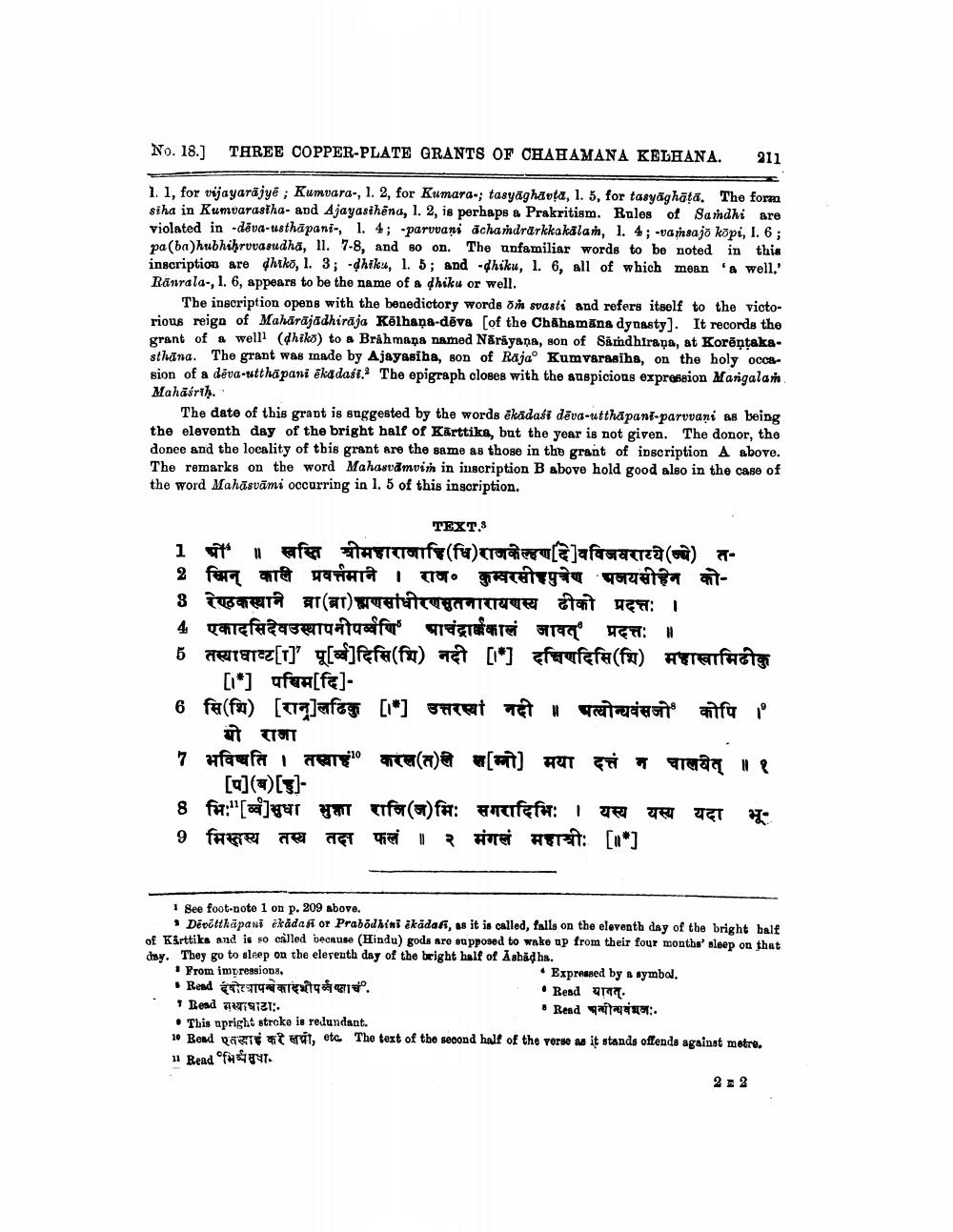________________
No. 18.] THREE COPPER-PLATE GRANTS OF CHAHAMANA KELHANA.
211
1. 1, for vijayarajye ; Kumvara., 1. 2, for Kumara.; tasyaghava, 1. 5, for tasyäghāļa. The form siha in Kumvarastha- and Ajayasihēna, 1, 2, is perhaps a Prakritism. Rules of Sardhi are violated in -dēva usthapani-, 1. 4; -paruvani achandrarkkakalan, 1. 4; -vaisajo kopi, I. 6; pa(ba)hubhihruvasudha, 11. 7-8, and so on. The unfamiliar words to be noted in this inscription are hiko, l. 3; dhiks, 1. 5; and Chiku, 1. 6, all of which mean 's well.' Ranrala-,1.6, appears to be the name of adhiku or well.
The inscription opens with the benedictory words on svasti and refers itself to the victorious reign of Mahārājādhirāja Kēlhaņa dēva [of the Chāhamāns dynasty). It records the grant of a welln (dhiks) to a Brāhmapa named Narayana, son of Sandhirapa, at Korāntakasthana. The grant was made by Ajayasiha, son of Raja° Kumvarasiha, on the holy occasion of a deva-utthapani Ekadasi. The epigraph closes with the auspicions expression Mangalan Mahāśrth.
The date of this grant is suggested by the words ēkädafi dēva-tutthāpani-paruvani as being the eleventh day of the bright half of Kärttika, but the year is not given. The donor, the donee and the locality of this grant are the same as those in the grant of inscription A above. The remarks on the word Mahasuämviin in inscription B above hold good also in the case of the word Mahasvāmi occurring in 1.5 of this insoription.
TEXT.S 1 प्रों ॥ स्वस्ति श्रीमहाराजाहि(धि)राजकल्हण दे]वविजयराय्ये(ज्ये) त१ स्मिन् काले प्रवर्त्तमाने । राज. कुम्बरसीपुत्रेण अजयसीहेन को3 रेठकस्थाने ब्रा(ब्राह्मणसांधीरणसुतनारायणस्य ढीको प्रदत्तः । 4 एकादसिदेवउस्थापनीपर्वणि पाचंद्राकालं जावत' प्रदत्तः ॥ 5 तस्याघाट[T]' पूर्व]दिसि(शि) नदी [*] दक्षिणदिसि(शि) महावामिढीकु
[*] पश्चिम दि]6 सि(शि) [रान]लढिकु [*] उत्तरस्यां नदी ॥ पत्योन्यवंसजो कोपि ।'
यो राजा 7 भविष्यति । तस्याहं करल(त)ले स[नो] मया दत्तं न चालयेत् ॥१
[प](ब)[]8 भि:"[व]सुधा भुक्ता राजि(ज)मिः सगरादिभिः । यस्य यस्य यदा भू9 मिस्तस्य तस्य तक्ष फलं ॥ २ मंगलं महाबी: [*]
See foot-noto 1 on p. 209 above.
Dépottkapavi ekadafi or Prabodhini ikadah, as it is called, falls on the eleventh day of the bright balt of Kirttiks and is so called because (Hindu) gods are supposed to wake up from their four months' sleep on that day. They go to sleep on the elerenth day of the bright half of Asbadhs. From impressions,
* Expressed by a symbol. • Read देवोधापन्चे कादशीपन छाच.
• Read यानत्. * Read AVASTZT.
• Read अन्योन्यवंशज:• This apright stroke in redundant. 10 Bend vaze # erat, etcThe text of the second half of the verse mit stands offends against metre. u Read 'भिधसुधा.




